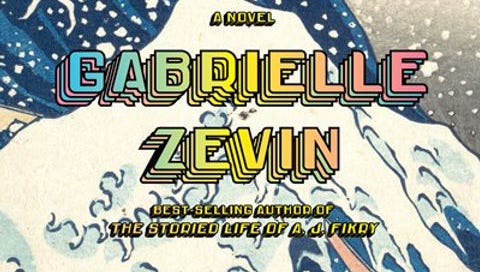Happy New Year, NoYes Press readers.
I’m writing from Partners Coffee in Williamsburg, on January 4th. I’ve ordered a whole milk cortado, because you have to specify now. This morning, I finished shooting a TikTok marketing campaign for an energy spray that’s like 100 times more caffeinated than a cup of coffee. Enough about me. I only wanted to give a little context and dimensionality to these reviews as they appear in your inbox. Thanks to each of you who have subscribed to this newsletter since last I published. I look forward to your company on this journey of self-indulgent critical writing and more.
Below, I’ve reviewed a novel that it seems like everyone has read; a real sign-of-the-times book. If you’re wondering what it has to do with Macbeth or The Great Wave of Kanagawa, I’m afraid I have no answers for you. You’ll have to read it for yourself!
One of the most popular novels of 2022, and the winner of that year’s Goodreads Choice awards (the people’s Pulitzer) is about a pair of video-game designers: Sam Mazer, a Korean-American boy, and Sadie Green, an Ashkenazi Jewish girl (Author Gabrielle Zevin herself comes from Korean and Russian-Jewish ancestry.) Our heroes are gamers, and basically geniuses. One gets caught up in a teacher-student age-gap entanglement. The other is a little autistic. A robust creative collaboration between them spans their early lifetimes, from childhood to mid-late-thirties. As the relationship ebbs and flows, it emerges as the central focus of the book.
Our story kicks off when the two reconnect as students in Boston, at Harvard and MIT respectively. They had met a decade earlier as kids in L.A., when Sam was in the hospital after a debilitating accident. His ensuing disability is not obscured, nor glorified. Sadie was there visiting her little sister in the pediatric oncology ward, and wound up Sam’s playmate at first organically, but then explicitly in exchange for a community service credit, when he wouldn’t speak to anyone else. The rocky but intimate foundation for friendship comes back to bite her. Zevin’s writing is sensitive, thoughtful, and expansive. This work feels firmly contemporary, touching on themes of ethnic and sexual identity, cultural appropriation, and grief with a casual fluency.
Sam and Sadie are never lovers, but they are often in love. The two develop a strong, if platonic, bond that proves neither dispassionate nor totally un-erotic. Their baby is a game design company, effectively launched while they are still in college, under the tutelage of Sadie’s Israeli professor and paramour Dov Mizrah (and also at first using his graphic engine, lauded for its unparalleled representation of light.) The company, eventually named Unfair Games, brings on a third partner: Sam’s roommate and unofficial caretaker, the Japanese Marx Watanabe, whose charisma and measured presence are vital not only for the project, but also for Sam and Sadie’s relationship. Of course, they all each have their own independent connections.
With Marx serving as business administrator and executive, as well as interpersonal moderator and neutral, calming, force, Unfair Games produces five of Sam and Sadie’s video games during the novel’s timeline. Ichigo, Ichigo 2, Both Sides, Master of the Revels, and Pioneers each have a distinct and painstakingly developed sense of aesthetics, narrative, motion, allegory, and control. The reader doesn’t have to be a computer science nerd to appreciate the detailed description of each game with regards to technical engineering, game theory and storytelling.
Meanwhile, life happens. Graduations, marriages, funerals, fights, and children all pepper these pages. While generally linear, we do jump around a bit in time to engage with memories from Sam’s and Sadie’s growing up. We travel, from Cambridge and Venice Beach to New York, Tokyo, and beyond. That’s not even counting all the built worlds; avatars and landscapes done in bits and pixels, which host surprising amounts of dramatic action and emotional resonance. By the poignant conclusion, Tomorrow and Tomorrow and Tomorrow gives its characters, and by extension its author, and readers, an opportunity to look back at more than a quarter-century, and reflect upon the state of society: from evolutions in acceptable forms of love, friendship, and creative expression, to the strange hyperreality that takes shape through digital representation.





For a non-gamer, I agree that the descriptions of the games and the worlds were key to my enjoyment of the book. A surprise. The tangled Emotional relationship was also compelling. For people who have a successful company, they were terrible communicators in their personal lives. That felt realistic.
The review satisfies as I am not sure the novel would; thank you for that.